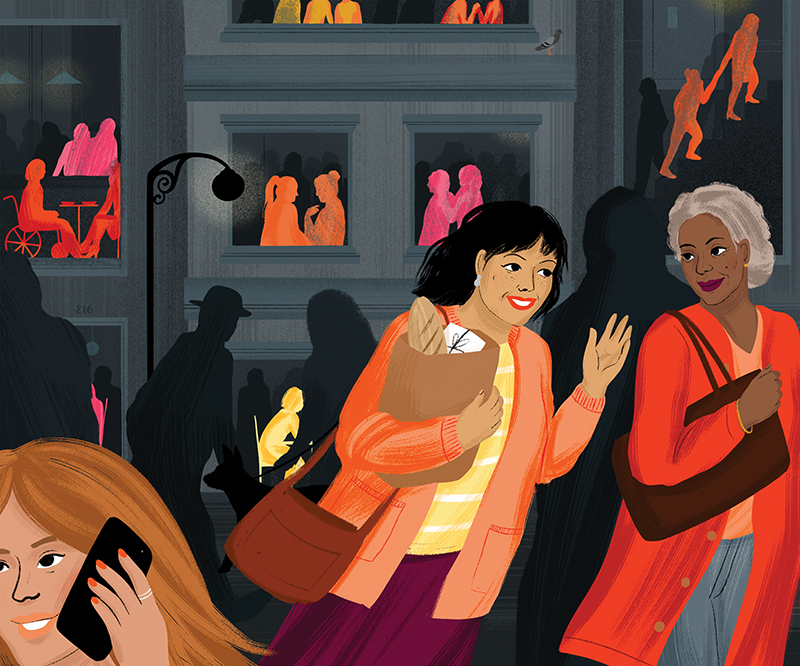
Last February, I received an email from a writer friend compiling a collective ŌĆ£letter to my daughter in the era of Trump and #MeToo.ŌĆØ She was asking me and other mothers to reflect on how we might prepare our young daughters to negotiate relationships with men and boys, and how we might discuss sexual harassment, assault, and patriarchy with them. I adore this friend and admired her project; for months I considered how to respond, before I finally gave up.
This wasnŌĆÖt like me. IŌĆÖm scrupulous about replying to requests, completing assignments, doing what others ask. I have always been a good girl. Growing up in the Philadelphia suburbs in the ŌĆÖ80s and early ŌĆÖ90s ŌĆö the only child of quiet, responsible, somewhat emotionally repressed parents ŌĆö I was shy, studious, lonely. I had a handful of equally studious female friends and no boyfriends, no romantic encounters of any kind. I didnŌĆÖt drink, didnŌĆÖt go to parties. In college, though I met wonderful people and began to open up a bit more, I remained totally inexperienced when it came to sex and relationships. My big moment of triumph came not from an end to that status, but from confessing to one dear female friend my great embarrassment about it.╠²
In my twenties, living in Seattle, I finally began dating and having relationships. I met men I became involved with at house parties, at a French conversation group, out salsa dancing, in graduate school. I had a few brief sexual encounters that felt weirdly thrilling or ultimately disappointing, but in no way threatening. I developed several close friendships with men. But my most essential relationships were with women: my roommates, friends, confidants, colleagues, role models. We spent a good deal of time talking about our experiences with men, but we also discussed our careers, our families, our psychological realizations about ourselves. We talked about books, movies, ideas, dreams. I donŌĆÖt think anything made me feel as happy as engaging in candid, intimate conversations with the women in my life.╠²
Even after I entered into a committed partnership in my early 30s with a man IŌĆÖd loved for years, I still carried around a kind of shame. The humiliation of having missed out on experiences it seemed like everyone else had, the mortification of having felt unattractive, undesired. ItŌĆÖs only in the past few years, now in my 40s, raising two daughters with my partner in Ann Arbor, and absorbing the long overdue revelations of the #MeToo movement, that IŌĆÖve begun to take a different perspective on my years as a teenage girl and young woman.╠²
Across the generations, we must find and recognize each other.
Hearing so many stories of women whoŌĆÖve been made to feel shame over being the object of unwanted male sexual attention, IŌĆÖve come to realize that my story of being ignored is also one of good fortune. IŌĆÖm lucky to have missed out on being able to claim ŌĆ£Me too.ŌĆØ╠²
Though I came to my romantic relationships with plenty of insecurities, I also came to them without the trauma of having been forced or pressured to do anything I didnŌĆÖt want to do with my body. And in my workplace contexts, which have been for the most part female-dominated, IŌĆÖve never had to deal with harassment or with suspecting that being female has put me in an inferior position. This is not to say that I havenŌĆÖt encountered the effects of patriarchy ŌĆö IŌĆÖve encountered them within my own family of origin. IŌĆÖve studied and taught literature and cultural representations, and this work has alerted me to a variety of ways in which flawed and harmful ideas about gender are perpetuated.╠²
My inability to respond to the question my friend posed a year ago, about how I might prepare my daughters for a range of unpleasant gendered realities, came partly from the difficulty and complexity of that question. How do we warn girls and young women about the potential dangers they face in possessing female bodies, while simultaneously encouraging them to embrace their own bodily autonomy and pleasure? How do we convey the message that they should be able to pursue anything they want to do, while teaching them to recognize the disparities that still very much exist?╠²
But I was also flummoxed because of my own past, because of the ways in which IŌĆÖd allowed my self-doubts and disappointments to circumscribe my identity.╠²
Once in high school, while walking down the hallway with a few friends, our English teacher, a woman in her 50s, called out, ŌĆ£Look at these strong women.ŌĆØ I bristled at the comment. I got good grades and I wanted to be seen as smart, but I did not want to be seen as a strong woman. I wanted to be a pretty girl; I wanted a boyfriend; I wanted to feel like a normal teenager.╠²
It was the early ŌĆÖ90s, the time of the Anita Hill hearings, of Bill Clinton becoming president. Just before the election, I went with a friend to a rally in downtown Philadelphia, but we didnŌĆÖt go for political reasons, though our liberal Jewish families were pro-Clinton. We went because we had a crush on Ken Olin from Thirtysomething, and he was speaking at the rally, and afterwards we tremblingly asked him for a selfie (long before it would be called a selfie), and then we each had a photo to put in our photo albums, of his handsome, manly face between our two timid girl ones. ╠²
I still donŌĆÖt know what to tell my daughters; I will need to rely on the advice of other women I respect and admire for that. But if I could write a letter from the future to my girl self, I would have a lot to say. I would be gentle and I would be stern. I would acknowledge the pain of her loneliness, but IŌĆÖd also tell her there would come a time when she would be so consumed by her various roles of being a mother and a domestic partner and a friend and a working professional that she would crave solitude more than anything else. I would point out that the sooner she stopped feeling sorry for herself, the better, that instead she should be grateful in advance for all the people who were going to come into her world ŌĆö men, yes, but also women, who would guide and challenge and love her.╠²
IŌĆÖve been lucky to have close friendships with women my same age, experiencing life events along with me as peers. IŌĆÖve been lucky, too, for the counsel and the example of women in the next stages of life. Across the generations, we must find and recognize each other. ╠² ╠²
If I could go back to that moment with my high school English teacher, who knew me and the friends I was walking down the hall with from our writing, and our contributions in class, and the one-on-one conversations she took the time to have with us, I wouldnŌĆÖt slink sheepishly away when she called us strong women. I would turn around and look her in the eye, this woman who grew up in the 1940s and ŌĆÖ50s, who saw her students as they would one day ŌĆö if not then ŌĆö want to be seen. And I would say thank you.╠²
Ann Arbor-based writer-editor Polly RosenwaikeŌĆÖs story collection, Look How Happy IŌĆÖm Making You (Penguin Random House, 2019), was named one of │ę▒¶▓╣│Š┤Ū│▄░∙ŌĆÖs ŌĆ£Best Books of 2019ŌĆØ and one of AmazonŌĆÖs ŌĆ£Best Books of 2019 for Literature and Fiction.ŌĆØ╠²
|
| ╠² |
|










